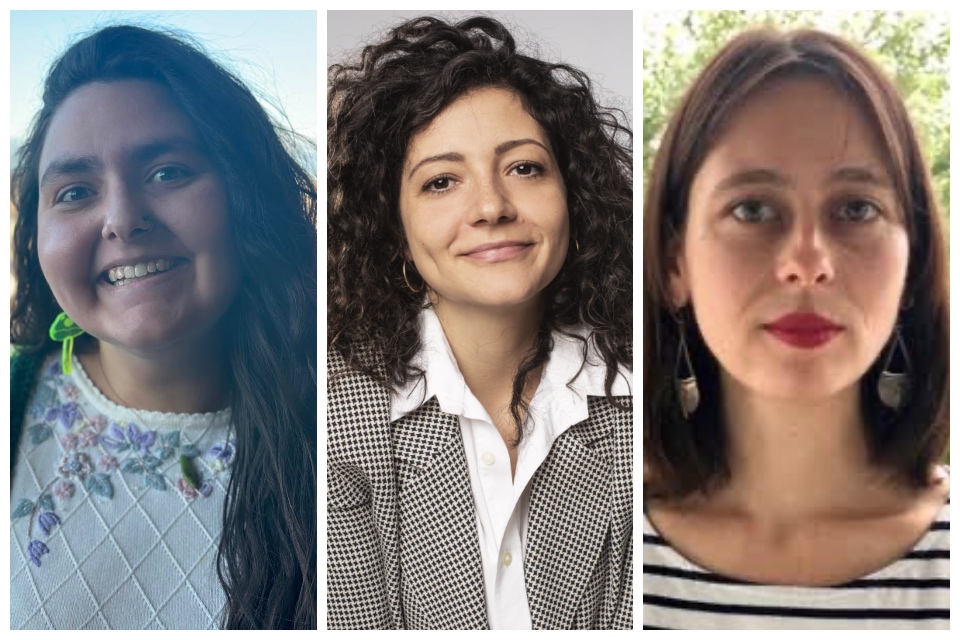Paving the way for the women of today
Three graduate students from the Graduate School of Arts and Sciences are bringing important stories to the surface, and, as a result, paving the way for women of today.
 Photos provided by students
Photos provided by studentsLeft to right: jessie neal, GSAS MA’23, Alexandra M. Szabo, GSAS PhD’25, and Samantha Leonard, GSAS PhD’23
Looking back through history, women’s lives and accomplishments were often left out of the narrative of nations, communities and movements. Women’s History Month is an opportunity to look for lost stories and to ensure that women’s experiences are central to all kinds of research and scholarship going forward.
These three graduate students from the Graduate School of Arts and Sciences are bringing important stories to the surface, and, as a result, paving the way for women of today.
Alexandra M. Szabo, GSAS PhD’25
Her work: As a Phd candidate in history, Szabo’s research uncovers miscarriage experiences after the Holocaust, as a consequence of the Nazi mass sterilization that was enforced on Jewish and Romani women. The survivors endured long-term effects of reproductive losses.Szabo has found that for Jewish and Roma women who survived mass murder and other atrocities of the Holocaust, the emotions around their miscarriages were minimized in comparison. Through looking into the archives in New York, Washington D.C, Hungary, Germany, and the main Holocaust archives of Jerusalem, Szabo hopes to get a better perspective of the full story.
“The survivors live everywhere,” said Szabo. “Their stories weren’t elevated into political documentation like the stories of men were.”
Szabo sees a connection to the contemporary misconceptions around miscarriage.
“As a society, we tend to keep miscarriage a secret,” she said. “I want to be a part of changing that. We need to be able to talk about the pain of reproductive and fertility events.”
Why she does it: “I have so much to tell the world. Earning a history degree was the best way to do that,” said Szabo. “We don’t often see nuanced depictions and experiences of a genocide focused on gender. Someone has to tell this side of the story.”
jessie neal, GSAS MA’23
Her work: In their Women’s, Gender, and Sexuality studies program, neal chose to study something close to her heart; her family and grandmother’s matriarchal legacy, the CHamoru people and their histories. The CHamoru people are the indigenous people of the Mariana Islands, an area that has experienced colonization from multiple empires over the last 500 years.
Due to military occupation by the United States in 1898, neal’s grandmother was one of the first CHamoru women to come to the United States for college. As a result, the majority of the archival history of CHamoru peoples lies in the oral histories and tradition of storytelling.
Through retelling her grandmother’s stories, neal is in the early process of writing a book that centers Indigenous ways of doing and knowing while examining the ways in which CHamoru customs are present and reproduced in the U.S. today.
Why she does it: “It’s so important for me to bring visibility to my community,” said neal. “I’m looking to bring value to experiences that have been unvalued over time. I want women, like my Nana, Teresita Ignacio Santos Currie, to recognize the strength in a story that isn’t always centered.”
Samantha Leonard, GSAS PhD’23
Her work: Before coming to Brandeis, Leonard focused on supporting survivors of gender-based violence as an advocate and case planner in Massachusetts and New York, and served as a volunteer in the Peace Corps. Her experiences influenced her to explore the systems in place to support survivors.
In her sociology program, she is researching modern-day social movements against gender-based violence in Boston and Buenos Aires.
“I’m focusing on activists, advocates, policy workers, and researchers in both sites,” she said. “I want to understand the ways they’re defining the problem of intimate violence,” and creating solutions.
Why she does it: “I do this work because I have hope. I believe there’s a possibility of a future without violence. My research focuses on those who are actively trying to imagine such alternative futures.”
Categories: General, Humanities and Social Sciences, Research, Student Life





